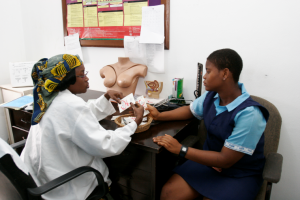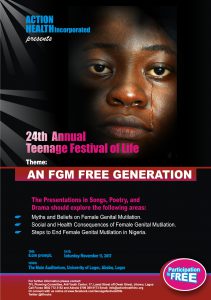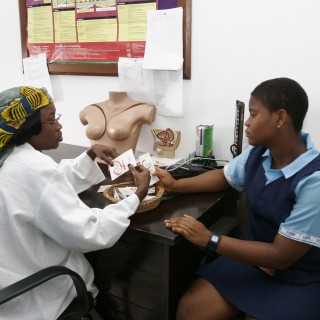You may already know that young people are greatly affected by the HIV/AIDS pandemic and in Nigeria, young women carry a staggering proportion of the burden of HIV. HIV stands for Human Immunodeficiency Virus, a virus that attacks and weakens the body’s immune system, allowing infections to develop. AIDS stands for Acquired Immune Deficiency Syndrome. All persons living with AIDS are infected with HIV, but not all persons with HIV infection have AIDS. AIDS is only the end stage of this infection.
Because young people are so vulnerable to HIV infection, it is essential to be well informed about HIV risks and prevention strategies, so that together, our generation can end HIV and AIDS.
1. How Is HIV Spread?
HIV is present in the bodily fluids of persons infected with the virus. A person who is HIV-positive can pass the virus to others through their semen (including the drops of “pre-ejaculate” fluid that flow from the penis prior to ejaculation), vaginal secretions, breast milk, or blood. The virus is most commonly transmitted through the exchange of semen and vaginal secretions during sex. HIV is transmitted not only through vaginal or anal sex between a man and a woman; it can also be transmitted through anal sex between two men. Oral sex also carries some risk for HIV transmission. HIV can also be passed from an HIV-positive mother to her baby during pregnancy, delivery, or breastfeeding.
HIV can also be passed to others by transfusion of infected blood or by sharing needles with an infected individual for drug use, body piercing, or tattooing. Although using contaminated instruments during manicures, pedicures, or shaving may carry a risk of infection, HIV transmission through these routes is highly unlikely.
2. Ways that HIV Cannot Be Transmitted
There are many myths about how HIV spreads. HIV cannot be transmitted by any of the following:
- Touching, sneezing, or coughing
- Casual contact at work, school, or home (such as hugging or shaking hands)
- Sharing food, drink, or utensils
- Sharing bath water or swimming pools
- Sharing toilet seats or using public toilets
- Bites from mosquitoes, bed bugs, or other insects
- Tears or sweat
- Saliva or kissing (HIV is not in saliva, but cut or bleeding gums may increase risk of infection through kissing)
- Urine and faeces do not transmit HIV if they do not contain blood.
3. How can a person know if he or she — or his or her sex partner — has HIV?
Millions of people who are HIV-positive feel and look completely healthy for years. They have no symptoms, and have no idea that they are passing the virus to others. You cannot tell by merely looking at a person if he/she is infected with HIV!
The only way to know if you have been infected with HIV is to take an HIV test. The only way to know if your sex partner is HIV-positive is if he or she takes an HIV test and shares the result with you. The HIV test detects special cells (called HIV antibodies) that are present if the person is infected. Tests can usually detect HIV antibodies within six to eight weeks of exposure. In rare cases, it may take as long as six months for the antibody level to be detected by a test.
A positive HIV test means that the person has HIV antibodies and is infected with the virus. If the first test is positive, a second, different test may be conducted to confirm the results. A negative HIV test means that the person is not infected with HIV. Or it may mean that he or she is infected but has not yet made enough HIV antibodies to test positive. Someone who tests HIV-negative but suspects that he or she was recently exposed to the virus should take the test again in a few months.
4. Prevention of STIs/HIV
After reading this, or if you know someone who has HIV or AIDS, you probably want to know how to protect yourself from becoming infected. There are many things you can do:
- Abstain from all forms of sexual intercourse. Having sex as an adolescent is an unwise idea for many reasons — including the high risk of HIV to those who begin having sex at a young age.
- Stay away from situations that cause you to feel pressured or intimidated. For example, do not get intimately involved with an adult.
- Do not allow anyone to pressure you into unwanted or unsafe sex—or other unsafe activities. You have the right at any time to say no. If someone—anyone—tries to persuade or prevail upon you to have unwanted or unsafe sex, report that person to a trusted adult.
- If you choose to have sex, ensure you and your partner use male or female condoms.
- Never pressure another person to have unwanted or unsafe sex.
- Avoid alcohol and drugs. These substances affect your judgment, and make it more likely you will engage in risky behaviour that you regret later.
- Never share needles.
- If you suspect you have an STI, seek prompt and complete testing and treatment.
- If you need to receive a transfusion or blood product, be sure it has been properly screened for HIV and other STIs.
- If your skin is going to be pierced (by a needle, syringe, or other equipment), check to be sure that the equipment being used is sterile.
- If someone is raped, immediate treatment with anti-HIV medication can greatly reduce the chances of becoming infected. It is very important to seek immediate care if one is raped.
5. What About Living with HIV or AIDS?
People who are HIV-positive can live for a long time and can maintain a productive life. They may marry and have families. However, they need proper medical care, counselling, and social support. Counselling is important to ensure they start prompt treatment and understand the importance of taking good of themselves and their health in general. Counselling can also prepare a person feel more comfortable about disclosing his or her HIV status to current and past sex partners and to family members.
If you have a friend or family member living with HIV or AIDS, you may feel overwhelmed and not know how to help. There is a lot you can do. The most important is to provide love and attention. You can remind the person to take their medication (even if it causes side effects) and to keep medical appointments. If the person is sick or weak, you can assist with chores like shopping or cleaning.
Finally, you can educate others. You can help them understand how HIV is, and is not, transmitted. You can also remind others that every person deserves dignity, and that people living with HIV and AIDS have a right to live free of stigma and discrimination.
THE AHI YOUTH CLINIC
* Are you between the ages of 10 and 21 years?
* Are you struggling with a health or relationship problem?
* Have you been sexually abused/raped and don’t know what to do?
* Are you worried about getting pregnant or contracting a sexually transmitted infections/ HIV?
Send a text message, email, give us a call or visit our centre!
Address: 17 Lawal Street, Off Oweh Street, Jibowu, Yaba, Lagos
Telephone: 0812-344-5837
Email: info@actionhealthinc.org
Website: www.actionhealthinc.org
Hours of operation:
Monday – Friday: 8:00am – 5:00pm
Saturday: 9:00am – 1:00pm
CONFIDENTIALITY IS GUARANTEED








You must be logged in to post a comment.